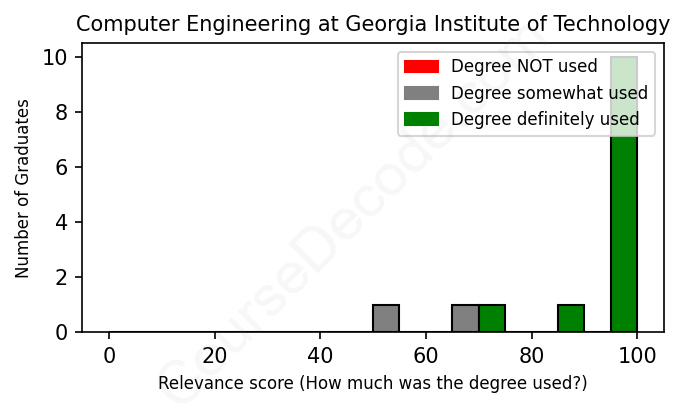
First, some facts. Of the Computer Engineering graduates from Georgia Institute of Technology we've analyzed , here's how many have used (or NOT used) their degree in their career:

These are estimates based on AI analysis of 14 LinkedIn profiles (see below).
The verdict? Great! Overall, with an average relevance score of 90%, Computer Engineering graduates from Georgia Institute of Technology have a substantially higher likelihood (+23%) of finding work in this field compared to the average graduate across all fields:
And for comparison, here's the chart for all profiles we've looked at across all degrees.
Also, after graduating, 42% of these graduates have pursued further education other than another Bachelor's degree (such as a Masters degree or other), compared to the average across all profiles of 35%. This suggests you may need more than just a Bachelors degree to be competitive as a Computer Engineering graduate.
See the details:
|
Relevance score: 100% We think this person has gone into a career highly relevant to their degree. We think this person has gone into a career highly relevant to their degree.
DEGREE INFOGraduated in 2020 from Georgia Institute of Technology with a Bachelor of Engineering - BE in Computer Engineering. No other secondary education since. JOB HISTORY SINCE GRADUATIONSoftware Engineer Amazon Jul 2020 - Present ABOUTNo information provided. |
The top 10 most common jobs done by the graduates we've analyzed (ranked most common to least) are:
From analyzing the LinkedIn profiles of graduates from Georgia Tech's Computer Engineering program, it seems that a significant number of these individuals have landed jobs primarily as Software Engineers or in software-related roles. These positions often require strong programming skills and an understanding of system design, both of which are key components of a Computer Engineering curriculum. Other common roles include various types of engineering consultants and validation engineers, particularly in tech firms like Intel and NVIDIA. However, some graduates also took paths that seem less aligned with traditional computer engineering, such as finance analysts or operations roles at companies like Capital One and ConocoPhillips.
In general, it's clear that many graduates have managed to secure positions that are directly relevant to their computer engineering degrees, especially those focused on software development or systems design. However, there are also quite a few instances where the roles don't require specific computer engineering expertise, leaning more towards business, consulting, or general tech operations. This shows that while a Computer Engineering degree provides a solid foundation for many technical roles, it also opens up doors in a variety of fields that may not directly relate to core engineering principles. So, if you're considering this degree, it's important to recognize both the strong technical job prospects as well as the potential for diverse career paths beyond the engineering sphere.
Here is a visual representation of the most common words in job titles for Computer Engineering graduates (this is across all Computer Engineering graduates we've analyzed, not just those who went to Georgia Institute of Technology):

Looking at the career trajectories of graduates from Georgia Tech's Computer Engineering program, it seems like these folks generally kickstart their careers in solid tech-related roles. Many of the graduates' first jobs include positions like Software Engineer or Analyst, often at well-known companies such as Broadcom, Deloitte, and Intel. For example, graduates from 2010 and 2018 are scoring jobs as Software Engineers right out of school, while some even find roles in analytics and consulting. This trend indicates a strong pathway into the tech industry, reflecting the value of a degree from Georgia Tech, which is highly regarded in engineering and tech circles.
If we zoom out to about 5 to 10 years down the line, the picture continues to look pretty good. Graduates are often moving up the ranks, transitioning from entry-level positions to senior roles like Senior Consultant at PwC or even more specialized jobs like Robotics and Controls Engineer. The variety of fields is also impressive, with alumni working in software engineering, data science, and even military roles, like those in the Marine Corps. It's clear that Georgia Tech’s Computer Engineering program is setting people up for successful and fulfilling careers, mainly in tech-related industries, which is pretty encouraging if you’re thinking about pursuing this path.
Honestly, a Bachelor’s degree in Computer Engineering at Georgia Tech is pretty challenging, but it's also super rewarding if you're into tech stuff. The coursework is intense and covers everything from programming and circuits to complex algorithms, and you'll definitely need to put in some serious study time. It’s generally considered harder than your average degree because you’ll face a lot of problem-solving and critical thinking tasks, plus group projects that can be both fun and frustrating. If you enjoy tackling tough challenges and have a passion for technology, you'll likely thrive, but be ready to put in the effort!
Most commonly, in the LinkedIn profiles we've looked at, it takes people 4 years to finish a Bachelor degree in Computer Engineering.
Looking at the career paths of these Georgia Tech grads, it definitely seems like they’re doing pretty well financially, especially considering the tech industry tends to pay well. Those who graduated earlier, like in 2010 and 2013, have climbed into solid positions at reputable companies like Broadcom and Deloitte, which suggests they’ve likely made a good salary along the way. The more recent graduates, particularly those landing roles at places like Apple, Amazon, and NVIDIA, are also entering the field at high salaries. Even those starting in military roles seem to be leveraging their experience into tech jobs, which can be quite lucrative. So yeah, overall, it looks like they're definitely making decent money!
Here is a visual representation of the most common words seen in the "about" section of LinkedIn profiles who have a Bachelor degree in Computer Engineering (this is across all Computer Engineering graduates we've analyzed, not just those who went to Georgia Institute of Technology). This may or may not be useful:

Here are all colleges offering a Bachelor degree in Computer Engineering (ordered by the average relevance score of their Computer Engineering graduates, best to worst) where we have analyzed at least 10 of their graduates:
| College | Score | Count |
|---|---|---|
 University of Florida University of Florida
|
95 | 18 |
 Michigan State University Michigan State University
|
94 | 10 |
 Brigham Young University Brigham Young University
|
94 | 10 |
 Penn State University Penn State University
|
92 | 14 |
 California Polytechnic State University-San Luis Obispo California Polytechnic State University-San Luis Obispo
|
91 | 14 |
 University of Central Florida University of Central Florida
|
90 | 14 |
 Georgia Institute of Technology Georgia Institute of Technology
|
90 | 14 |
 Purdue University Purdue University
|
86 | 34 |
 University of Illinois at Urbana-Champaign University of Illinois at Urbana-Champaign
|
86 | 30 |
 Iowa State University Iowa State University
|
86 | 25 |
 Texas A&M University Texas A&M University
|
85 | 17 |
 San Jose State University San Jose State University
|
85 | 16 |
 Clemson University Clemson University
|
85 | 14 |
 Dwarkadas J. Sanghvi College of Engineering Dwarkadas J. Sanghvi College of Engineering
|
85 | 10 |
 North Dakota State University North Dakota State University
|
84 | 12 |
 Savitribai Phule Pune University Savitribai Phule Pune University
|
83 | 25 |
 University of Mumbai University of Mumbai
|
82 | 43 |
 New Jersey Institute of Technology New Jersey Institute of Technology
|
81 | 11 |
 University of North Carolina at Charlotte University of North Carolina at Charlotte
|
79 | 11 |
 California State Polytechnic University-Pomona California State Polytechnic University-Pomona
|
76 | 11 |
 The University of Texas at Dallas The University of Texas at Dallas
|
76 | 18 |
 University of South Florida University of South Florida
|
69 | 10 |
 Gujarat Technological University, Ahmedbabd Gujarat Technological University, Ahmedbabd
|
55 | 13 |